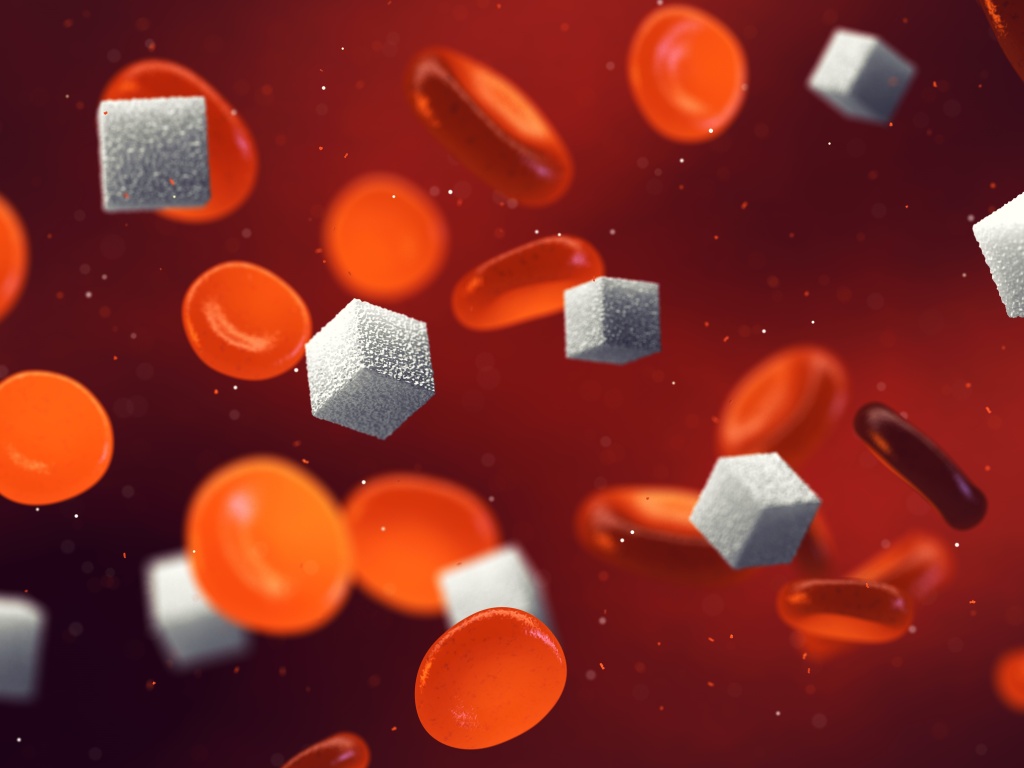In the past, I’ve had difficulties with my blood sugar. If I went more than four hours or so without eating, I got dizzy and weak. Fortunately, It’s not that difficult to arrange to get food within four or five hours. As long as I kept an eye on it, I wasn’t overly bothered. Although once I didn’t eat for about three days and didn’t just get dizzy, my entire body started shaking.
But a good while back, when I was undiagnosed and unmedicated, I had a different relationship with food. When I was manicky (which in my case manifested as anxiety) I didn’t eat much. I got so skinny that I feared my parents would notice when they came to town for my graduation. So I ate bananas and drank milkshakes in hopes of putting a few pounds on.
But when I was depressed, I ate—poorly, but I ate. I had certain go-to depression foods. Sugared cereals. Carbohydrates like mashed potatoes, fries, and other comfort foods. And a peculiar combination of wavy potato chips and cream cheese topped by an M&M. My husband knew to get worried when I asked him to pick up those ingredients.
But back to blood sugar. The interactions between blood sugar and bipolar disorder are complicated because the interactions between the body and the mind are too. Let’s look at some of those interactions.
First, there are medications. It’s well-known that bipolar and other psychotropic medications can cause weight gain. And in turn, overweight can lead to diabetes. I have indeed gained weight—a lot of it, in fact. (I still prefer fat to misery.) I haven’t acquired diabetes, but I no longer get the low blood sugar weakies.
Then, there’s stress. Bipolar disorder can be affected by stress, of course. Stress can exacerbate the symptoms. The symptoms can cause stress. It can be hard to break the cycle. But stress releases the hormones cortisol and adrenaline into the body, and those substances can cause blood sugar to rise. Poor quality sleep and irregular sleep patterns also affect your body’s chemicals in ways that can affect blood sugar.
Also, as I’ve learned, bipolar can alter your eating habits, causing your blood sugar to behave like a yo-yo. It can also affect your ability to care for yourself in other ways, such as not having the wherewithal to exercise. These lifestyle changes can also make your blood sugar fluctuate.
Also, though this isn’t well understood, there may be genetic factors that are associated with both bipolar disorder and high or low glucose levels. As always, more research is needed.
So, what does this all mean? First, that you should be aware of your blood sugar fluctuations. Maybe track how they correspond to your moods and your lifestyle factors. I’m not saying that you need to get a glucose meter (though if you have one, that’s great). Just know that the two conditions can interact, and the more you know about how they affect you personally, the better off you’ll be. You may be able to make changes in your diet, exercise level, and sleep habits that will make a difference.
Stress reduction is also something that will be beneficial for both conditions. Your therapist may have recommended stress reduction techniques such as meditation or mindfulness (among others), and you may find that these help, too. If, like me, you have high levels of anxiety, your family doctor or psychiatrist may be able to prescribe you an anti-anxiety med that could also help regulate your sleep patterns.
Watching your blood glucose won’t hurt and might help you deal with your bipolar or other disorders. It seems to me that it’s worth a try.



Comments on: "What’s My Blood Sugar and Why Does It Matter?" (1)
I wasn’t diagnosed with bipolar disorder until I was 45, so I don’t know if my low blood sugar affected my moods. I do know that I had very low blood sugar. When I didn’t eat on time, I immediately got the shakes. I also lost cognitive function at times. Once, I went to pay for my fast food burger and couldn’t count the change. I ended up pouring it on the counter and letting the teller count out what she needed. Another time, I bought a baked potato with cheese and sour cream for lunch. An hour later, I got really bad shakes. I could barely walk. I had to tell myself how to walk to get to the elevator and go down and order something else. At the time I was 5’3″ and 97 lbs. In college, I would drink a can of grapefruit juice and eat a package of cheese crackers with peanut butter just before my weight lifting class, so that I didn’t shake too bad while lifting weights. It worried my teacher when I shook, lol. He thought I was liffting too much weight and was goiing to drop it. Fast forward to now, at 67. Last year I was up to 150 lbs and couldn’t even fit into my biggest clothes, and I didn’t want to go bigger. I had already gone from a size 5 to a size 14. This was over several years. So, I finally took control and went to see a nutrionist. She helped me get on a healthy diet which helped me lose weight and not become shaky again. I’m back down to 113 lbs, which is a little less than I wanted, only by 2 lbs, lol. It took a year of no treats or bread. Now, most of my clothes don’t fit me again, lol. It didn’t get rid of the saggy skin and I haven’t been able to make myself go to the gym. I do my stretching exercises though. I’m mostly happy with my body now, which definitely makes a difference in my mood.
LikeLiked by 1 person